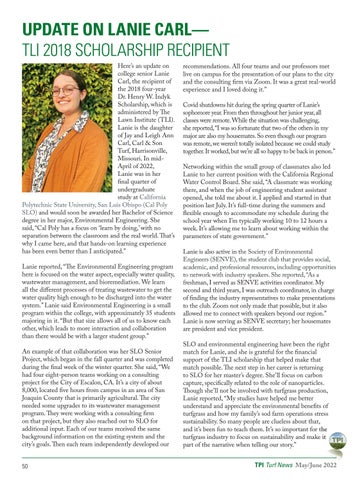UPDATE ON LANIE CARL— TLI 2018 SCHOLARSHIP RECIPIENT Here’s an update on college senior Lanie Carl, the recipient of the 2018 four-year Dr. Henry W. Indyk Scholarship, which is administered by The Lawn Institute (TLI). Lanie is the daughter of Jay and Leigh Ann Carl, Carl & Son Turf, Harrisonville, Missouri. In midApril of 2022, Lanie was in her final quarter of undergraduate study at California Polytechnic State University, San Luis Obispo (Cal Poly SLO) and would soon be awarded her Bachelor of Science degree in her major, Environmental Engineering. She said, “Cal Poly has a focus on ‘learn by doing,’ with no separation between the classroom and the real world. That’s why I came here, and that hands-on learning experience has been even better than I anticipated.” Lanie reported, “The Environmental Engineering program here is focused on the water aspect, especially water quality, wastewater management, and bioremediation. We learn all the different processes of treating wastewater to get the water quality high enough to be discharged into the water system.” Lanie said Environmental Engineering is a small program within the college, with approximately 35 students majoring in it. “But that size allows all of us to know each other, which leads to more interaction and collaboration than there would be with a larger student group.” An example of that collaboration was her SLO Senior Project, which began in the fall quarter and was completed during the final week of the winter quarter. She said, “We had four eight-person teams working on a consulting project for the City of Escalon, CA. It’s a city of about 8,000, located five hours from campus in an area of San Joaquin County that is primarily agricultural. The city needed some upgrades to its wastewater management program. They were working with a consulting firm on that project, but they also reached out to SLO for additional input. Each of our teams received the same background information on the existing system and the city’s goals. Then each team independently developed our
50
recommendations. All four teams and our professors met live on campus for the presentation of our plans to the city and the consulting firm via Zoom. It was a great real-world experience and I loved doing it.” Covid shutdowns hit during the spring quarter of Lanie’s sophomore year. From then throughout her junior year, all classes were remote. While the situation was challenging, she reported, “I was so fortunate that two of the others in my major are also my housemates. So even though our program was remote, we weren’t totally isolated because we could study together. It worked, but we’re all so happy to be back in person.” Networking within the small group of classmates also led Lanie to her current position with the California Regional Water Control Board. She said, “A classmate was working there, and when the job of engineering student assistant opened, she told me about it. I applied and started in that position last July. It’s full-time during the summers and flexible enough to accommodate my schedule during the school year when I’m typically working 10 to 12 hours a week. It’s allowing me to learn about working within the parameters of state government.” Lanie is also active in the Society of Environmental Engineers (SENVE), the student club that provides social, academic, and professional resources, including opportunities to network with industry speakers. She reported, “As a freshman, I served as SENVE activities coordinator. My second and third years, I was outreach coordinator, in charge of finding the industry representatives to make presentations to the club. Zoom not only made that possible, but it also allowed me to connect with speakers beyond our region.” Lanie is now serving as SENVE secretary; her housemates are president and vice president. SLO and environmental engineering have been the right match for Lanie, and she is grateful for the financial support of the TLI scholarship that helped make that match possible. The next step in her career is returning to SLO for her master’s degree. She’ll focus on carbon capture, specifically related to the role of nanoparticles. Though she’ll not be involved with turfgrass production, Lanie reported, “My studies have helped me better understand and appreciate the environmental benefits of turfgrass and how my family’s sod farm operations stress sustainability. So many people are clueless about that, and it’s been fun to teach them. It’s so important for the he turfgrass industry to focus on sustainability and make it part of the narrative when telling our story.” TPI Turf News May/June 2022














